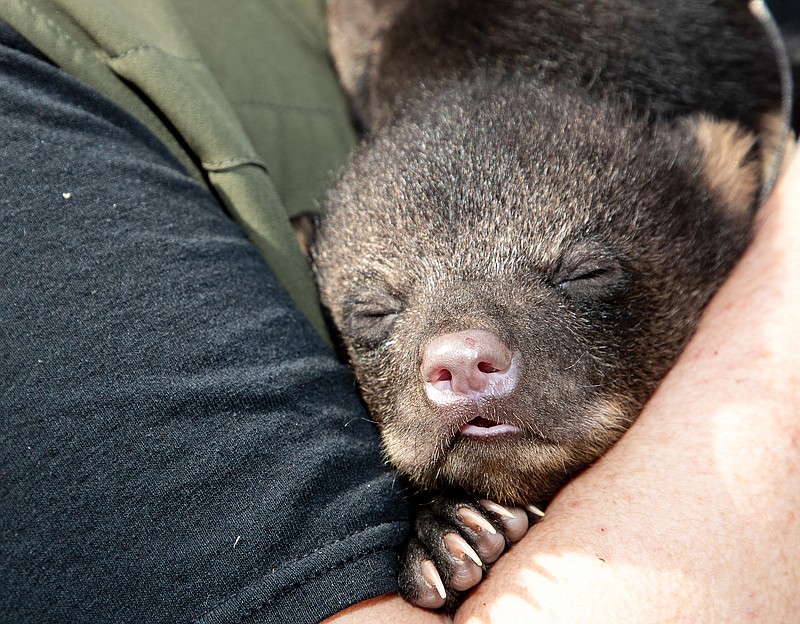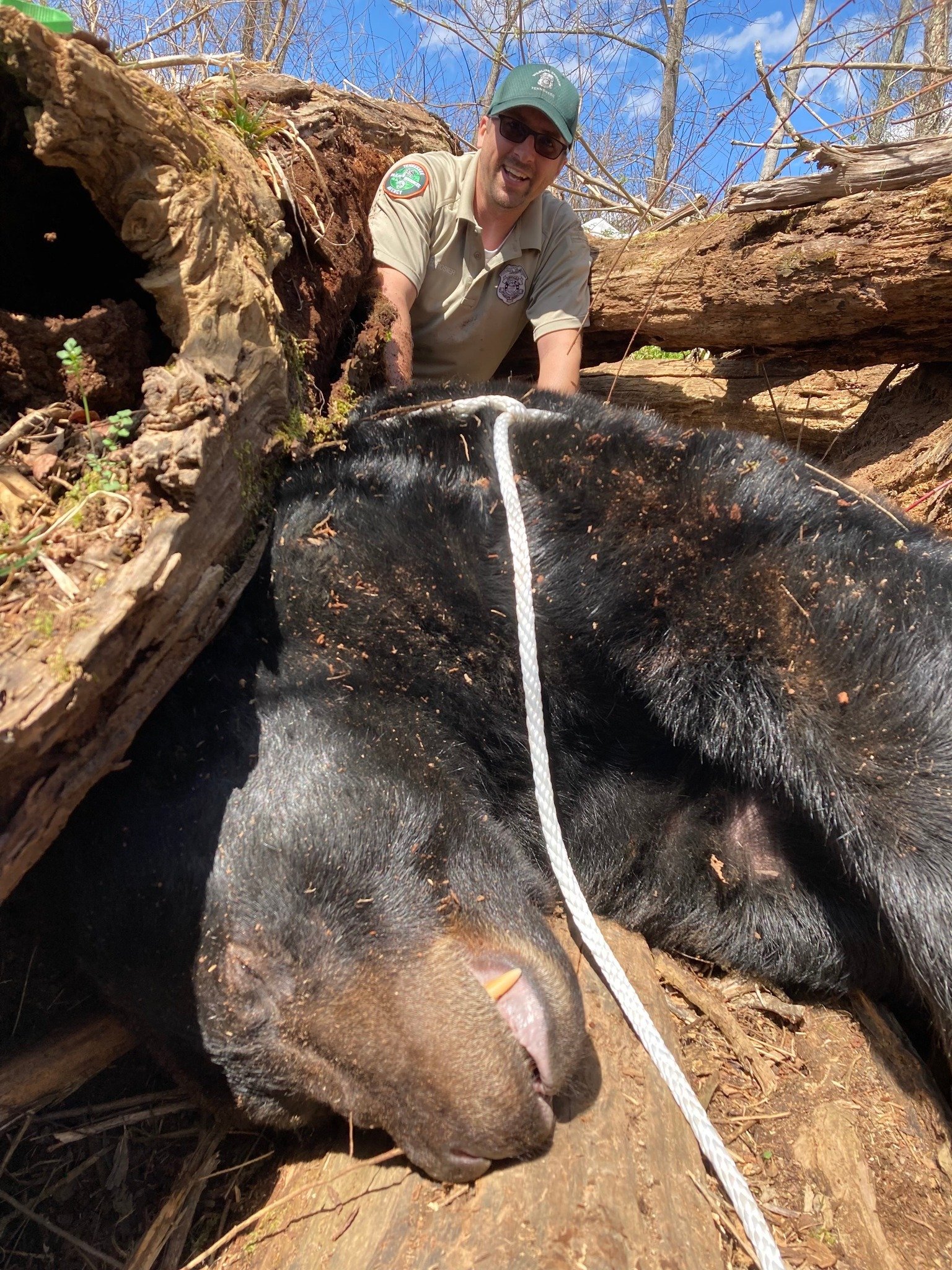With the early spring warmup, black bears are beginning to emerge from dens to seek food, and that greatly increases the chance for humans and bears to come into contact with each other and create a potentially dangerous situation.
"Bears are not true hibernators," Tennessee Wildlife Resources Agency spokeswoman Mime Barnes said Wednesday in an email. "They do sleep a lot, and mothers that give birth do den and stay in dens longer. This is to allow the young time to grow. Adult bears without young sleep through weather events, but they also wake and forage throughout the winter."
Mother bears right now are staying in their dens while their young cubs are growing, but other adults could be out looking for food almost any time, she said. A second-year cub, called a sub-adult at this age, will be waking periodically throughout the winter, and they'll head out on their own soon, Barnes said.
"Bears are omnivores and can dig for insects and roots, eat buds on trees, grasses and many other things," Barnes said.
So far, Tennessee's bears haven't been out enough to get into trouble with humans, she said.
"We've not had a large number of conflicts in our region," Barnes said of her TWRA Region II office in Crossville, which include the Chattanooga region of Tennessee. "The most common issues result from inappropriate feeding and habituation of bears."
In March 2022, a 500-pound male black bear was relocated from the area of the Tusculum University campus in Greeneville, Tennessee, after it had become habituated to human food, TWRA Sgt. David Carpenter said last year. That bear had regular access to garbage, birdseed and pet food, and had been in the area for a few years, but its activity and property damage had increased, forcing its removal.
(READ MORE: Trio of black bear cubs collared near Tennessee-Alabama state line)
South of Tennessee in Georgia, March is when black bears typically begin to emerge, according to Gerald Hodge Jr., founder and CEO of Appalachia Georgia Friends of the Bears. Georgia has a black bear population of about 3,000, Hodge said.
"We already have received reports of adult males and sub-adults that are out and about," Hodge said earlier this month in a statement on bear activity. "Second to emerge will be the solitary females and sows with yearlings in late March, mid-April."
Hodge said sows with cubs born this year will appear in mid-April to early May, and warmer temperatures tend to make them more active.
This time of year, people can sometimes come across young bear cubs and mistake them for orphans because they're unattended or alone, according to Dana Dodd, executive director of Appalachian Bear Rescue in Townsend, Tennessee.
"Cubs that were born this year are still in the den, and moms with newborn cubs usually don't come out till sometime between April 1 and April 15," Dodd said Thursday in a phone interview. "Moms with yearling could absolutely be out now."
The rescue in Townsend recently received three small orphaned yearlings that were very underweight and unhealthy, and were apparently separated from their mother for some time, Dodd said. Rescue officials are unsure how the trio of cubs were orphaned.
It's important for people to understand that a lone cub isn't necessarily orphaned, and no one should try to make that call themselves, according to Dodd.
(READ MORE: Tennessee is full of animals that can kill you. Here's a guide to staying alive)
"If you think a cub is orphaned right now, do not touch it or do anything with it," Dodd said. "Call your local wildlife agency and let them know about it and let the biologists who know what they're doing make the determination whether they're orphaned or not. Moms often leave cubs unattended, and they may leave them for a while, even an hour or two."
Dodd said it is hard to resist the "miserable" sound cubs make when they're left alone, but people should try not to let cubs talk them into accidentally making a cub an orphan.
"It's a miserable experience to listen to it and do nothing, but you've got to give mom time to come back," she said.
Black bear history
Black bears are the largest predator in the U.S. east of the Mississippi River and once roamed the entire state of Tennessee and most of North America, according to TWRA. In coastal areas of the Southeast, the American alligator and American crocodile can be as large or larger than a black bear. Black bear numbers first began to decline in North America after Europeans began settling in the bears' habitat, and the decline in Tennessee continued despite the creation of the Great Smoky Mountains National Park and the Cherokee National Forest in the 20th century.
According to TWRA, the 1970s marked the beginning of Tennessee's modern era when the Tennessee Game and Fish Commission closed the bear hunting season from 1970 through 1972 in hopes the population would rebound. But when the season resumed in 1973, only 16 bears were harvested, 14 of which were killed in the Tellico Wildlife Management Area, making it obvious that more extensive management was needed.
A report from the 1974 Eastern Workshop on Black Bear Management reported black bears remained in only 10 counties, according to TWRA.
(READ MORE: Study seeks genetic background of bears)
After teaming up with like-minded bear folks in neighboring North Carolina and Georgia for the Tri-State Bear Study in 1976, officials developed a collaboration on black bears, adding Kentucky, South Carolina and Virginia to the group renamed the Southern Appalachian Black Bear Study Group, which now meets twice a year to discuss bear issues, according to TWRA.
Since then, black bear populations have continued to grow with the added protection of females and habitat for breeding. While bears can be hunted in certain portions of Tennessee, hunting remains prohibited in the Smokies and in bear sanctuaries and reserves.
With populations increasing, so do the chances of human-bear conflict and reasons to take precautions, Barnes and Hodge agreed.
TWRA OFFERS THE FOLLOWING TIPS
-- If you see a bear in your yard, try to look large and make a lot of noise, back slowly away.
-- Never approach or follow a bear to take photos.
-- Do not purposefully feed bears.
-- Remove all attractants from your yard, including bird feeders, uneaten pet food and ripe fruits or garden vegetables.
-- Store grills in a garage or outbuilding.
-- Store trash and recycling in bear-proof containers.
-- Do not feed birds between April and January, when bears are most active.
-- Remove uneaten pet food from outside areas or feed pets indoors.
-- Do not add greasy foods to your compost piles or compost in bear-proof containers.
-- Keep cooking grills clean and stored indoors when not in use.
Source: Tennessee Wildlife Resources Agency
BE BEAR-WISE ON VACATION
BearWise.com offers tips for vacation rentals to help visitors avoid encounters with black bears.
—Enjoy bears from a distance and never approach them.
— Feeding bears (intentionally or unintentionally) trains them to approach homes and people for more food, and you may be ticketed and fined.
—Bears may be defensive when people get too close.
— Secure your food and garbage.
—Clean and store your barbecue grill.
— Keep doors and windows closed.
Source: bearwise.org
TIPS FOR HIKERS IN BEAR COUNTRY
— Stay on established trails.
— Hike in groups during daylight hours only.
— Keep children close and in sight at all times.
— Make your presence known
— Call out.
— Bears may be more aggressive during droughts, storms and forest fires.
— Avoid carcasses. Report dead animals near a trail or campsite to local wildlife officials.
— If an animal approaches, back away to maintain a safe distance.
— Taking pets on hiking trails is not advised — they may attract bears or cougars.
Sudden Close Encounters
— Don’t panic! Calmly group together and pick up small children. Do not run, make sudden movements or direct aggressive eye contact, which may instinctively cause the bear to charge.
— If the black bear clacks its teeth, “woofs,” pants, growls or slaps its paws on the ground, it is warning you to back off.
— Give the bear a chance to identify you as a human and not a threat. Let the bear calm down and retreat. Talk firmly in a low-pitched voice while backing away.
— A bear that continues to follow or circle you, disappears and reappears or enters your campsite during the day or night is possibly exhibiting predatory behavior.
— If the bear continues to approach or becomes threatening, your group should become increasingly aggressive by shouting, throwing rocks or using bear spray.
Bear Attack
If a black bear attacks you, fight back by hitting its nose and eyes with your fists and by kicking. Your hiking companions can help you fight with walking sticks, pans, branches and rocks or their bear spray. Don’t play dead with black bears.
Source: www.bebearaware.org
BLACK BEARS IN TENNESSEE
The species in Tennessee is primarily black with a straight, brown snout, but other color phases, including brown, cinnamon and rust, have been noted in the Eastern U.S. White patches on the chest can also be present, according to the Tennessee Wildlife Resources Agency. Tennessee has an estimated 4,000-5,000 black bears, but officials point out some of those bears travel between Tennessee and its neighbors.
Adult bears can be 3 feet tall at the shoulder and 6 feet long. Weights range between 125 to 600 pounds for adults, and females are generally smaller.
According to TWRA. black bears have average eyesight but fantastic hearing and an amazing sense of smell, possibly one of the best noses in the animal kingdom, according to TWRA. Black bears’ sense of smell is 100 times greater than a human and seven times greater than a bloodhound’s. They are great swimmers and capable of running 30 mph for short bursts. Black bears are very dexterous and strong and have been seen unscrewing lids of jars and easily tearing open metal containers to reach food.
Black bears are most active at dawn and dusk, although they can be active any time in areas where humans are less common. Bears bed down on the hottest of days, in cooler safe locations, according to TWRA. Healthy, normal bears avoid humans and areas around human dwellings.
Source: Tennessee Wildlife Resources Agency
Contact Ben Benton at bbenton@timesfreepress.com or 423-757-6569.

